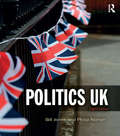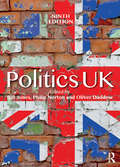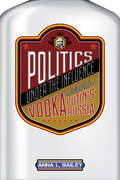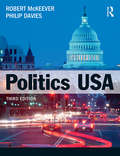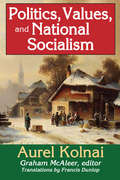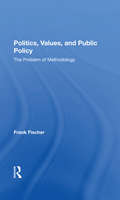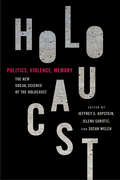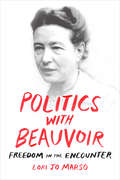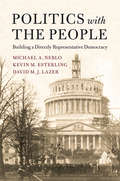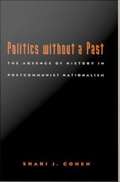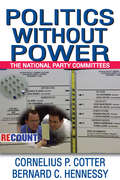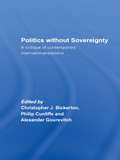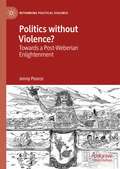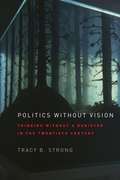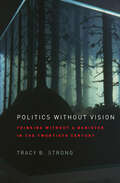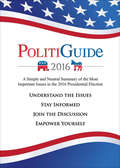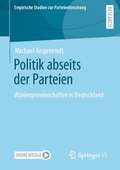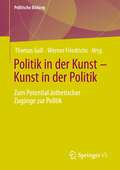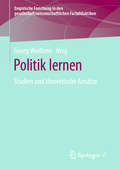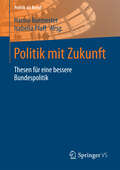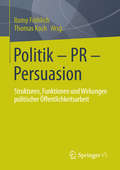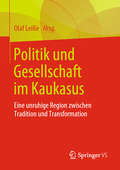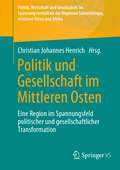- Table View
- List View
Politics UK: Featuring 2005 Election
by Bill Jones Philip NortonThe revised and updated eighth edition of the bestselling textbook Politics UK is an indispensible introduction to British politics. It provides a thorough and accessible overview of the institutions and processes of British government, a good grounding in British political history and an incisive introduction to the issues facing Britain today. With contributed chapters from respected scholars in the field and contemporary articles on real-world politics from well-known political commentators, this textbook is an essential guide for students of British politics. The eighth edition welcomes brand new material from eight new contributors to complement the rigorously updated and highly valued chapters retained from the previous edition. The eighth edition includes: · Britain in context boxes offering contrasting international perspectives of themes in British politics. · A comprehensive 'who's who' of politics in the form of Profile boxes featuring key political figures. · And another thing ... pieces: short articles written by distinguished commentators including Jonathan Powell, Michael Moran and Mark Garnett. · Fully updated chapters plus new material providing excellent coverage of contemporary political events including: The Leveson Inquiry, the aftermath of the 2011 riots and the House of Lords reform. · A vibrant and accessible new design to excite and engage students as the work through a variety of political topics. · A new epilogue to the book offering a critical perspective of the trials and tribulations of the Coalition Government, including an overview of the major differences that divide the coalition partners.
Politics UK: Featuring 2005 Election
by Bill Jones Philip Norton Oliver DaddowThis revised and updated ninth edition of the bestselling textbook Politics UK is an indispensable introduction to British politics. It provides a thorough and accessible overview of the institutions and processes of British government, a good grounding in British political history and an incisive introduction to the issues and challenges facing Britain today, including the European referendum and Brexit. The ninth edition welcomes brand new material from seven new contributors to complement the rigorously updated and highly respected chapters retained from the previous edition. It delivers excellent coverage of contemporary events including a new chapter on Euro-scepticism and the European referendum, an assessment of the performance of Labour’s leadership, the trials and tribulations of the Liberal Democrats and UKIP, and the evolving devolution debate in Scotland, led by the Scottish Nationalist Party. Features of the new edition include: Britain in context boxes offering contrasting international perspectives on key themes in British politics A comprehensive ‘who’s who’ of politics in the form of Profile boxes featuring key political figures And another thing . . . pieces containing short articles written by distinguished commentators including Mark Garnett, Sir David Omand, Richard Wilkinson and Sir Simon Jenkins An epilogue analyzing the turbulent state of UK politics following the European referendum With chapters written by highly respected scholars in the field and contemporary articles on real-world politics from well-known political commentators, this textbook is an essential guide for all students of British politics.
Politics under the Influence: Vodka and Public Policy in Putin's Russia
by Anna L. Bailey"You know just how serious a problem alcoholism has become for our country. Frankly speaking, it has taken on the proportions of a national disaster." So spoke Russian President Dmitry Medvedev in 2009 as the government launched its latest anti-alcohol campaign. Challenging the standard narrative of top-down implementation of policy, Anna Bailey’s Politics under the Influence breaks new ground in the analysis of Russian alcoholism and the politics of the Putin regime.The state is supposed to make policy in the national interest, to preserve the nation’s health against the ravages inflicted by widespread alcohol abuse. In fact, Bailey shows, the Russian state is deeply divided, and policy is commonly a result of the competitive interactions of stakeholders with vested interests. Politics under the Influence turns a spotlight on the powerful vodka industry whose ties to Putin’s political elite have grown in influence since 2009. She details how that lobby has used the anti-alcohol campaign as a way to reduce the competitiveness of its main rival—the multinational beer industry. Drawing on a wide range of sources including fieldwork interviews, government documents, media articles, and opinion polls, Bailey reveals the many ambivalences, informal practices, and paradoxes in contemporary Russian politics. Politics under the Influence exhibits the kleptocratic nature of the Putin regime; as a result, analysis of vested interests and informal sources of power is essential to understanding public policy in contemporary Russia. This book will be an invaluable resource for anyone working on policy and corruption in Putin’s Russia.
Politics USA
by Robert J. McKeever Philip DaviesPolitics USA is a lively and authoritative introduction to American politics, giving students a rich and varied resource for all aspects of their course. The book provides expert and comprehensive analysis of US politics and government, including in-depth coverage of the presidency, the Congress, the Supreme Court and American foreign policy. This third edition of Politics USA has been thoroughly updated to include analysis of Challenges and policies of the first Obama administration Recent results and developments in US elections Latest major decisions of the US Supreme Court Contemporary American Foreign Policy This is an ideal introduction for students of US politics as well as anyone seeking to understand any or all aspects of politics in one of the world’s most powerful and globally influential countries.
Politics, Values, and National Socialism
by Aurel KolnaiThe essays in this collection, spanning 1925 to 1970, confirm Aurel Kolnai's place as one of the great conservative theorists of the twentieth century. Kolnai carefully analyzes the leading intellectual positions and thinkers of his day, the dominant social movements, and the prevailing moral influences—psychoanalysis, fascism, and National Socialism. He documents how they run counter to the architecture of civilization.Kolnai is relatively unknown outside philosophical circles, but Politics, Values, and National Socialism provides an overview of his moral philosophy. In most moral philosophy books one finds pages devoted to the major theories of ethics. This volume is different. It seeks to address the larger moral question of what kind of thought works against morality, and by implication, how one can defend morality.Eager to protect the surviving islands of Liberal Civilization, Kolnai's concern is really one of theory. He shows that much of what passes for moral theory is subversive of moral order. All who think that totalitarianism is a permanent threat, and who suspect that ideas can quickly be dangerously distorted in times of social unrest, will find plenty of clarifying ideas in this volume.
Politics, Values, And Public Policy: The Problem Of Methodology
by Frank FischerAddressed to the growing concerns about norms and values in policy assessment, this study develops a methodology for the political evaluation of public policy. It is designed to move policy evaluation beyond its current emphasis on efficient achievement of goals, focusing instead on the assessment of the acceptability of the goals themselves, emplo
Politics, Violence, Memory: The New Social Science of the Holocaust
by Jeffrey S. Kopstein Jelena Subotić Susan WelchPolitics, Violence, Memory highlights important new social scientific research on the Holocaust and initiates the integration of the Holocaust into mainstream social scientific research in a way that will be useful both for social scientists and historians. Until recently social scientists largely ignored the Holocaust despite the centrality of these tragic events to many of their own concepts and theories. In Politics, Violence, Memory the editors bring together contributions to understanding the Holocaust from a variety of disciplines, including political science, sociology, demography, and public health. The chapters examine the sources and measurement of antisemitism; explanations for collaboration, rescue, and survival; competing accounts of neighbor-on-neighbor violence; and the legacies of the Holocaust in contemporary Europe. Politics, Violence, Memory brings new data to bear on these important concerns and shows how older data can be deployed in new ways to understand the "index case" of violence in the modern world.
Politics with Beauvoir: Freedom in the Encounter
by Lori Jo MarsoIn Politics with Beauvoir Lori Jo Marso treats Simone de Beauvoir's feminist theory and practice as part of her political theory, arguing that freedom is Beauvoir's central concern and that this is best apprehended through Marso's notion of the encounter. Starting with Beauvoir's political encounters with several of her key contemporaries including Hannah Arendt, Robert Brasillach, Richard Wright, Frantz Fanon, and Violette Leduc, Marso also moves beyond historical context to stage encounters between Beauvoir and others such as Chantal Akerman, Lars von Trier, Rahel Varnhagen, Alison Bechdel, the Marquis de Sade, and Margarethe von Trotta. From intimate to historical, always affective though often fraught and divisive, Beauvoir's encounters, Marso shows, exemplify freedom as a shared, relational, collective practice. Politics with Beauvoir gives us a new Beauvoir and a new way of thinking about politics—as embodied and coalitional.
Politics with the People: Building a Directly Representative Democracy (Cambridge Studies in Public Opinion and Political Psychology #555)
by Michael A. Neblo Kevin M. Esterling David M. LazerMany citizens in the US and abroad fear that democratic institutions have become weak, and continue to weaken. Politics with the People develops the principles and practice of 'directly representative democracy' - a new way of connecting citizens and elected officials to improve representative government. Sitting members of Congress agreed to meet with groups of their constituents via online, deliberative town hall meetings to discuss some of the most important and controversial issues of the day. The results from these experiments reveal a model of how our democracy could work, where politicians consult with and inform citizens in substantive discussions, and where otherwise marginalized citizens participate and are empowered. Moving beyond our broken system of interest group politics and partisan bloodsport, directly representative reforms will help restore citizens' faith in the institutions of democratic self-government, precisely at a time when those institutions themselves feel dysfunctional and endangered.
Politics without a Past: The Absence of History in Postcommunist Nationalism
by Shari J. CohenIn Politics without a Past Shari J. Cohen offers a powerful challenge to common characterizations of postcommunist politics as either a resurgence of aggressive nationalism or an evolution toward Western-style democracy. Cohen draws upon extensive field research to paint a picture of postcommunist political life in which ideological labels are meaningless and exchangeable at will, political parties appear and disappear regularly, and citizens remain unengaged in the political process. In contrast to the conventional wisdom, which locates the roots of widespread intranational strife in deeply rooted national identities from the past, Cohen argues that a profound ideological vacuum has fueled destructive tension throughout postcommunist Europe and the former Soviet Union. She uses Slovakia as a case study to reveal that communist regimes bequeathed an insidious form of historical amnesia to the majority of the political elite and the societies they govern. Slovakia was particularly vulnerable to communist intervention since its precommunist national consciousness was so weak and its only period of statehood prior to 1993 was as a Nazi puppet-state. To demonstrate her argument, Cohen focuses on Slovakia's failure to forge a collective memory of the World War II experience. She shows how communist socialization prevented Slovaks from tying their individual family stories--of the Jewish deportations, of the anti-Nazi resistance, or of serving in the wartime government--to a larger historical narrative shared with others, leaving them bereft of historical or moral bearings. Politics without a Past develops an analytical framework that will be important for future research in Eastern Europe, the former Soviet Union, and beyond. Scholars in political science, history, East European and post-Soviet studies will find Cohen's methodology and conclusions enlightening. For policymakers, diplomats, and journalists who deal with the region, she offers valuable insights into the elusive nature of postcommunist societies.
Politics without Power: The National Party Committees
by Bernard C. HennessyThe national committees of the major political parties in the United States are symbols of party government. They carry forward a national heritage of peaceful change in national politics and administration. National committees are substitutes for party ideologies, yet they are pretty much headless, drifting organizations. Cotter and Hennessy explain why this is the case, arguing that the vagueness of the committees' responsibilities between presidential elections is one of the main sources of their limitations.Politics without Power explains what the national committees are, who belongs to them, where they are located in relation to other politically oriented organizations, what they do, and what steps might be taken to make better use of them. Although the authors' descriptions in this classic volume are straightforward, their recommendations are sweepingly bold. A few have been instituted in part, but most have yet to be adopted. If they were, it would completely change the makeup of the two committees and the political processes.Among their proposals are that the offi ces of national committeeman and committeewoman should be abolished, that the national chairman of the in-party continue to be chosen by the president or candidate, and the national chairman of the out-party be the titular head of that committee. The out-party should have a party council to interpret the platform and to recommend a platform to the national convention. There should be a tax credit for small contributions to the national committee or state committees, and each national committee would have its own building shared with the Congressional Campaign Committees. This book will interest political scientists, politicians, and other students of American politics and elections.
Politics Without Sovereignty: A Critique of Contemporary International Relations
by Christopher J. Bickerton Philip Cunliffe Alexander GourevitchWritten by leading scholars, this volume challenges the recent trend in international relations scholarship – the common antipathy to sovereignty. The classical doctrine of sovereignty is widely seen as totalitarian, producing external aggression and internal repression. Political leaders and opinion-makers throughout the world claim that the sovereign state is a barrier to efficient global governance and the protection of human rights. Two central claims are advanced in this book. First, that the sovereign state is being undermined not by the pressures of globalization but by a diminished sense of political possibility. Second, it demonstrates that those who deny the relevance of sovereignty have failed to offer superior alternatives to the sovereign state. Sovereignty remains the best institution to establish clear lines of political authority and accountability, preserving the idea that people shape collectively their own destiny. The authors claim that this positive idea of sovereignty as self-determination remains integral to politics both at the domestic and international levels. Politics Without Sovereignty will be of great interest to students and scholars of political science, international relations, security studies, international law, development and European studies.
Politics without Stories
by David RicciLiberal candidates, scholars, and activists mainly promote pragmatism rather than large and powerful narratives - which may be called 'alpha stories' for their commanding presence over time. Alternatively, conservative counterparts to such liberals tend to promote their policy preferences in alpha stories praising effective markets, excellent traditions, and limited government. In this face-off, liberals represent a post-Enlightenment world where many modern people, following Max Weber, are 'disenchanted', while many conservatives, echoing Edmund Burke, cherish stories borrowed from the past. Politics without Stories describes this storytelling gap as an electoral disadvantage for liberals because their campaigning lacks, and will continue to lack, the inspiration and shared commitments that great, long-term stories can provide. Therefore, Ricci argues that, for tactical purposes, liberals should concede their post-Enlightenment skepticism and rally around short-term stories designed to frame, in political campaigns, immediate situations which they regard as intolerable. These may help liberals win elections and influence the course of modern life.
Politics without Violence?: Towards a Post-Weberian Enlightenment (Rethinking Political Violence)
by Jenny PearceThis book explores the potential for imagining a politics without violence and evidence that this need not be a utopian project. The book demonstrates that in theory and in practice, we now have the intellectual and scientific knowledge to make this possible. In addition, new sensibilities towards violence have generated social action on violence, turning this knowledge into practical impact. Scientifically, the first step is to recognize that only through interdisciplinary conversations can we fully realize this knowledge. Conversations between natural sciences, social sciences and the humanities, impossible in the twentieth century, are today possible and essential for understanding the phenomenon of violence, its multiple expressions and the factors that reproduce it. We can distinguish aggression from violence, the biological from the social body. In an echo of the rational Enlightenment of the eighteenth century, this book calls for an emotional Enlightenment in the twenty first and a post Weberian understanding of politics and the State.
Politics Without Vision: Thinking Without a Banister in the Twentieth Century
by Tracy B. StrongFrom Plato through the nineteenth century, the West could draw on comprehensive political visions to guide government and society. Now, for the first time in more than two thousand years, Tracy B. Strong contends, we have lost our foundational supports. In the words of Hannah Arendt, the state of political thought in the twentieth and twenty-first centuries has left us effectively "thinking without a banister. " Politics without Vision takes up the thought of seven influential thinkers, each of whom attempted to construct a political solution to this problem: Nietzsche, Weber, Freud, Lenin, Schmitt, Heidegger, and Arendt. None of these theorists were liberals nor, excepting possibly Arendt, were they democrats--and some might even be said to have served as handmaidens to totalitarianism. And all to a greater or lesser extent shared the common conviction that the institutions and practices of liberalism are inadequate to the demands and stresses of the present times. In examining their thought, Strong acknowledges the political evil that some of their ideas served to foster but argues that these were not necessarily the only paths their explorations could have taken. By uncovering the turning points in their thought--and the paths not taken--Strong strives to develop a political theory that can avoid, and perhaps help explain, the mistakes of the past while furthering the democratic impulse. Confronting the widespread belief that political thought is on the decline, Strong puts forth a brilliant and provocative counterargument that in fact it has endured--without the benefit of outside support. A compelling rendering of contemporary political theory, Politics without Vision is sure to provoke discussion among scholars in many fields.
Politics without Vision: Thinking without a Banister in the Twentieth Century
by Tracy B. StrongFrom Plato through the nineteenth century, the West could draw on comprehensive political visions to guide government and society. Now, for the first time in more than two thousand years, Tracy B. Strong contends, we have lost our foundational supports. In the words of Hannah Arendt, the state of political thought in the twentieth and twenty-first centuries has left us effectively thinking without a banister.Politics without Vision takes up the thought of seven influential thinkers, each of whom attempted to construct a political solution to this problem: Nietzsche, Weber, Freud, Lenin, Schmitt, Heidegger, and Arendt. None of these theorists were liberals nor, excepting possibly Arendt, were they democratsand some might even be said to have served as handmaidens to totalitarianism. And all to a greater or lesser extent shared the common conviction that the institutions and practices of liberalism are inadequate to the demands and stresses of the present times. In examining their thought, Strong acknowledges the political evil that some of their ideas served to foster but argues that these were not necessarily the only paths their explorations could have taken. By uncovering the turning points in their thoughtand the paths not takenStrong strives to develop a political theory that can avoid, and perhaps help explain, the mistakes of the past while furthering the democratic impulse.Confronting the widespread belief that political thought is on the decline, Strong puts forth a brilliant and provocative counterargument that in fact it has enduredwithout the benefit of outside support. A compelling rendering of contemporary political theory, Politics without Vision is sure to provoke discussion among scholars in many fields.
Politieke economie van een postkoloniale staat: Pakistan Economy: Een CaseStudy Geschiedenis, uitdagingen en respons 1947-2020
by Shahid Hussain RajaEen casestudy van Pakistan 1947-2020 Hoe historische bagage van kolonialisme in wisselwerking met neokoloniaal economisch beleid de inhoud en het verloop van de ontwikkeling van een postkoloniale staat beïnvloedt Politieke economie van een postkoloniale staat: Pakistan was een typische onderontwikkelde Staat toen het zijn reis als een onafhankelijke natiestaat begon op 14 augustus 1947, met talloze uitdagingen, variërend van existentiële dreiging tot revolutie van stijgende verwachtingen van de massa's en het worden van een onafhankelijke, zelfverzekerde en welvarende staat in de gemeenschap van naties aan de andere kant. De nieuwe Staat ging deze uitdagingen moedig aan en begon zijn reis letterlijk vanaf nul. Van een van de minst ontwikkelde landen ter wereld ten tijde van haar onafhankelijkheid, groeide de Pakistaanse economie met een vrij indrukwekkend tempo van 6 procent per jaar gedurende de eerste vier decennia van het bestaan van de Natie. Gedurende deze periode verdubbelde het inkomen per hoofd van de bevolking, ondanks het feit dat de bevolkingsgroei nooit onder de 3% per jaar uitkwam. Dankzij genereuze militaire en civiele hulp in de jaren zestig en daarna in de jaren tachtig bleef de inflatie laag en daalde de armoede van meer dan 45% tot minder dan 20%. Dit momentum kon daarna echter niet worden gehandhaafd vanwege de minder vriendelijke externe omgeving en het onhandige macro-economische beheer van de opeenvolgende regimes in de jaren negentig. De economische groei bleef iets hoger dan de bevolkingsgroei en de inflatie overschreed jaar na jaar de dubbele cijfers. Bijgevolg steeg de armoede tot 33%, de buitenlandse schuld explosief tot bijna het gehele BBP van Pakistan, het hoogste in Zuid-Azië. In de jaren 2000 keerde Pakistan terug naar zijn militaire fase en werd het opnieuw een frontlinie in de nasleep van 11 september, waardoor de Amerikanen in dit deel van de wereld kwamen en daarmee de gebruikelijke instroom van militaire en
PolitiGuide 2016: A Simple and Neutral Summary of the Most Important Issues in the 2016 Presidential Election
by Julian Rudolph Kyle Hackel"PolitiGuide 2016" offers the reader a simple, unbiased, and &“to the point&” discussion of the 2016 Election. In a short and succinct style, "PolitiGuide 2016" provides a clear understanding of the general stances that Democrats and Republicans take on issues such as the economy, abortion, global warming, healthcare, and more. With so much misinformation, misperception, and general discussion surrounding a Presidential election, "PolitiGuide 2016" serves to empower voters and enable them to join the political discussion. In addition, readers of "PolitGuide 2016" will walk away with the ability to understand the &“less talked about issues&” like Marijuana and Race Relations, while also feeling more comfortable about topics like: how to register to vote and what to expect on voting day.
Politik abseits der Parteien: Wählergemeinschaften in Deutschland (Empirische Studien zur Parteienforschung)
by Michael AngenendtIn Abgrenzung zu Parteien beschränkt sich der politische Wirkungskreis von Wählergemeinschaften auf die Kommunalpolitik, weshalb sie in Deutschland nicht die rechtlichen Kriterien für den Erwerb des Parteienstatus erfüllen. In ihrer Selbstdarstellung präsentieren sich Wählergemeinschaften deshalb als Alternative zu den in der Landes- und Bundespolitik etablierten Parteien. Michael Angenendt untersucht, ob Wählergemeinschaften faktisch Parteien darstellen, die sich unter dem Gewand der Parteifreiheit tarnen, oder ob sie sich substanziell von den Parteien unterscheiden, indem sie eine partizipatorische, parteienskeptische und organisatorische sowie elektorale Alternative bilden. Die Studie vermisst das Spektrum von Wählergemeinschaften in Deutschland umfassend und fokussiert drei Bereiche: Mitglieder, Identität sowie Organisation, Präsenz und Erfolg. Die theoretische Grundlage für die Analyse bilden etablierte Ansätze der Partizipations-, Einstellungs- und Parteienforschung. Das Werk basiert auf dem allgemeinen Interesse an den Voraussetzungen für politische Partizipation, den Ursachen von Parteienverdrossenheit und der Struktur politischer Organisationen. Als empirische Basis dient eine bundesweite Mitgliederstudie mit über 860 Befragten.
Politik in der Kunst – Kunst in der Politik: Zum Potential ästhetischer Zugänge zur Politik (Politische Bildung)
by Thomas Goll Werner FriedrichsDer Band versammelt Beiträge der Arbeitsgruppe Hermeneutische Politikdidaktik zum Thema Politik und Kunst. Politik hat sich schon immer ästhetischer Mittel bedient, um sich zu inszenieren. Umgekehrt ist Kunst ein Reflex auf die politische Verfasstheit der Gesellschaft. Kunst eröffnet damit einen Zugang zur Politik mit hohem Potential für die politische Bildung.
Politik lernen: Studien und theoretische Ansätze (Empirische Forschung in den gesellschaftswissenschaftlichen Fachdidaktiken)
by Georg WeißenoIm wissenschaftlichen Diskurs über politische Bildung lässt sich seit etwa dreißig Jahren eine starke Betonung empirischer Forschung feststellen. Durch die Entwicklung systematischer empirische Forschung hat sich zugleich die Frage nach der theoretischen Begründung der Politikdidaktik neu gestellt. Die Autorinnen und Autoren des vorliegenden Bandes untersuchen die Wissensvermittlung als eine Hauptaufgabe des Politikunterrichts. Sie verbinden sie mit individuellen Merkmalen wie der Motivation, unterrichtlichen Determinanten wie der Unterrichtsqualität und Kontextfaktoren wie dem Migrationshintergrund. Die theoretischen und empirischen Entwicklungen haben zu einer Ausdifferenzierung der Politikdidaktik und zu einem neuen Blick auf die Praxis des Politikunterrichts geführt.
Politik mit Zukunft: Thesen für eine bessere Bundespolitik
by Hanno Burmester Isabella PfaffDie deutsche Politik zerreibt sich im Spagat zwischen zunehmend protestbereiten Wählern vor Ort und der Anforderung, hyperkomplexe Probleme auf europäischer und globaler Ebene lösen zu müssen. Dadurch erodiert das Ansehen von Politik und Parteien - eine Bewegung, die letztlich demokratiegefährdend ist. Die in der Nachkriegszeit ausgeprägten Mitwirkungs- und Entscheidungsmechanismen der Bundesrepublik werden zunehmend in Frage gestellt; sie scheinen den Wählerbedürfnissen und Herausforderungen des 21. Jahrhunderts nicht mehr gerecht zu werden. Das Ergebnis: die Politik wird abgehängt. Dieses Buch ist ein leidenschaftliches Plädoyer für gute Politik - und die Voraussetzungen, die man für ihre Renaissance schaffen muss. In dreizehn streitbaren Thesen benennen Kenner des politischen Berlins offen die Schwächen des bundespolitischen Betriebs und zeigen, was sich ändern muss, um den Ansehensverlust der Politik zu stoppen. Dabei richtet sich der Blick nicht nur auf Politiker selbst, sondern auch auf die anderen Steuermänner des "Raumschiffs Berlin": Journalisten, Beamte, Berater und Mitarbeiter.
Politik - PR - Persuasion
by Romy Fröhlich Thomas KochEin Thema steht auch in wahlkampffreien Phasen immer wieder gerne im Fokus der Medien: Das Verhältnis zwischen Politik und Public Relations. Die Bandbreite reicht von kritischen Berichten über vermeintlich unethische bis illegale Verquickungen zwischen beiden, über die Kritik an der Tatsache, dass die Politik öffentliche Gelder für Kommunikationsdienstleister ausgibt oder über den Einfluss kollektiver und individueller Interessensvertreter auf politische Entscheidungsprozesse (z. B. Stuttgart 21) bis hin zur zuweilen stark skandalisierenden Berichterstattung über Aufträge an PR-Agenturen, bestimmte Spitzenpolitiker wirksam zu inszenieren. Der massenmedialen Aufmerksamkeit im Umgang mit diesem Thema steht die Tatsache gegenüber, dass die wissenschaftliche Auseinandersetzung damit im deutschsprachigen Raum noch eher ein stiefmütterliches Dasein fristet. Mit diesen Beiträgen werden die übergreifende Bandbreite und die Foci relevanter nationaler und internationaler Forschung und Literatur zum Thema gebündelt und zugänglich gemacht (,,mapping"). So kann das Buch für Wissenschaftler aber auch für Studierende, die sich mit dem Thema "Politik und Public Relations" beschäftigen, zu einer Art "key point of reference" für aktuellste und bisherige Forschung zum Thema werden
Politik und Gesellschaft im Kaukasus: Eine unruhige Region zwischen Tradition und Transformation
by Olaf LeißeDer Band nimmt eine umfassende Bestandsaufnahme der gegenwärtigen Lage der Kaukasus-Region vor. Er gibt einen breiten Überblick über die innenpolitische und gesellschaftliche Situation in Aserbaidschan, Armenien und Georgien, behandelt zugleich aber auch länderübergreifende Themen und nimmt die Politik der angrenzenden Staaten sowie der Europäischen Union in den Blick. Auf diese Weise entsteht ein komplexes Bild einer vielfältigen, jedoch politisch, sozial und militärisch instabilen Region. Deutsche und einheimische Wissenschaftler erarbeiten Zukunftsperspektiven für eine Region zwischen Tradition und Transformation.Der InhaltPolitik im Südkaukasus • Soziale Entwicklung und Minderheiten • Die Kaukasus-Region im außenpolitischen Fadenkreuz • AusblickDer HerausgeberDr. Olaf Leiße ist außerplanmäßiger Professor für Europäische Studien am Institut für Politikwissenschaft der Universität Jena.
Politik und Gesellschaft im Mittleren Osten: Eine Region im Spannungsfeld politischer und gesellschaftlicher Transformation (Politik, Wirtschaft und Gesellschaft im Spannungsverhältnis der Regionen Südosteuropa und Mittlerer Osten)
by Christian Johannes HenrichIn diesem Sammelband werden die historischen, politischen und gesellschaftlichen Facetten der politischen Systeme der einzelnen Länder des Mittleren Ostens analysiert. Auch die Transformationsprozesse in den Gesellschaften im Kontext des Arabischen Frühlings, des Krieges in Syrien, des Bürgerkriegs in Libyen oder des Putsches in Ägypten spielen eine zentrale Rolle. Ebenfalls wird Israel beleuchtet, das als unvollständige Demokratie der einzige Hoffnungsschimmer im Umfeld zahlreicher autoritärer und totalitärer Systeme ist. Die Region ist zudem aufgrund der energiepolitischen Abhängigkeit sehr wichtig für die Europäische Union.
